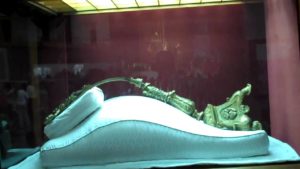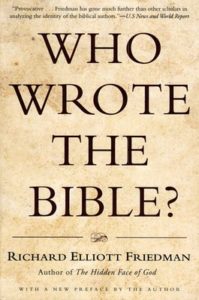[AUTHOR'S NOTE: This was another article originally published as the Atlanta Creationism Examiner, the first in a short series written shortly before the publication of my book Counterargument for God. The purpose of the series was to explain my alternative to Darwin's theory of natural selection as the best potential explanation for the origin of new species, based on the existing evidence. Although my alternate hypothesis involves a supernatural intelligence capable of designing the universe and life within, it is called iterative creation. Other articles in this series include The conjecture of evolution, Compounded improbabilities, and Iterative creation. This morning an atheist acquaintance on the internet inspired publication of this piece (originally written in 2012) by accusing me of advocating intelligent design as a scientific theory. The reality is that my argument is almost the polar opposite extreme -- iterative creation is a philosophical hypothesis that competes with the philosophy known as "macro" evolution to explain the existing scientific evidence, which consists of DNA analysis, the known fossil record, and comparative anatomy.] The "facts" of evolution This might take a while. The argument from authority, which could also be called the argument of superior intellect, gets old after a while. You don’t have to convince me that you’re smart. I'll give you the benefit of the doubt. You only need to convince me that you’re right. Then I'll actually believe what you tell me. A new Facebook friend tried to help me, sending a link to … [Read more...]
Proof versus evidence
Some of my atheist friends (excluding my friend Kyle, of course) are always demanding proof that God exists, but I've come to realize that they don't really mean it. What most of them want is to insist they have no reason to believe in a supernatural God, but generally because they simply don't want God to exist, because that would conflict with their existing worldview. Demanding proof that God exists implies that person does not fully understand the concept of faith. Proof and faith are mutually exclusive. If you have proof, faith is no longer required. Don't believe me? Let me prove it to you. (Pun intended) Anyway, honest scientists don't talk in terms of proof. Scientists mostly talk about what they can deduce from what the evidence tells them. Personally, I think that I waste too much of my life arguing with unhappy atheists. I don't particularly enjoy being constantly needled or ridiculed by very angry people simply for expressing my opinion, especially I don't really consider myself any sort of evangelist for Christianity. I'm just a writer. My best writing seems to focus on things that interest me, and because I consider myself a Christian, alleged evidence that supports Christian faith interests me quite a bit. But I understand that when I seek information about a story, I'm not seeking proof the story is true. I'm merely seeking evidence to support or debunk a claim being made. For example, I've said before that the Shroud of Turin will never and could never be fully authenticated as the burial cloth in which the body of Jesus Christ was … [Read more...]
Encouraging my Christian friends to think…
[AUTHOR'S NOTE: this seemed like an important article several years ago when I originally wrote it for Examiner.com, yet it seems even more relevant today. It is a review of sorts of a book I found very enlightening. Modern atheists tend to argue that the Bible is useless fiction, a conglomeration of stories assembled by illiterate farmers and shepherds, while many of their Christian contemporaries will argue that the Bible is the pure, unadulterated word of God. Naturally, I'm a little uncomfortable with both of those extremes. My opinion on the Bible is this: I worship the God that the Bible endeavors to describe to mankind, and I value the Bible. But the carpenter does not worship his hammer. He uses the hammer to make beautiful things. Therefore, I don't worship the Bible. I use the Bible as a tool that helps me worship the God I want to better understand.] Encouraging my Christian friends to think It's time to don the fire-proof asbestos suit. We've danced around the subject long enough. Is the Bible fact or fiction? The whole premise of writing as the Atlanta Creationism Examiner is to examine the question of whether or not we were actually created. This writer has played favorites for too long, ignoring the objections of my atheist and humanist friends and their criticisms of my preferred, sacred source of information, the Christian Bible. What about the fact there are two contradictory versions of the creation account in Genesis, they ask? Doing what anyone else would do when asked a question to which they didn't know the answer: I astutely chose to … [Read more...]
The childish atheism of Richard Carrier
Dr. Richard Carrier has a PhD in ancient history from Columbia University, but he might be best known for his zealous evangelism for atheism. Dr. Carrier is a historian, not a scientist, yet he is unafraid to wander away from the focus of his professional training to offer opinions on diverse subjects ranging from theology to cosmology and the origin of the universe, or his apparently uninformed thoughts on the chemistry necessary for the origin of life. In a relatively short (11+ minute) video seen by clicking on this link, Dr. Carrier enumerates the following four points to explain why he's not a Christian. His reasons are: God is silent. According to Richard Carrier, God doesn't exist because no messages from this deity have been universally communicated so that every human on earth has a fundamental understanding of what God wants and doesn't want us to do. Dr. Carrier says, "In every culture everywhere, God's gospel would have been preached to them by God Himself, he wouldn't need intermediaries. So we'd be able to confirm, yes, there's this guy called God somewhere, who's giving us all the same information, and we we would what that information is, and we would all still have the freedom to reject that message, or not care about it or whatever, but we would all agree on what that message was, there wouldn't be disagreements on it." Obviously, Dr. Carrier rejects the Bible as being the word of God, in spite of the fact there are (allegedly) 300 specific Old Testament prophesies that were reportedly fulfilled by the life, crucifixion, and resurrection … [Read more...]




